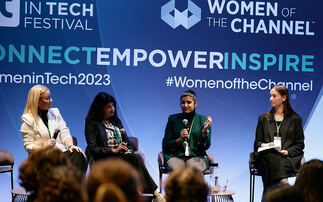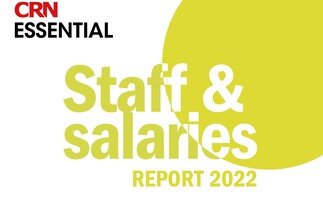Average median gender pay gap among UK's 50 largest resellers remains at 22 per cent, only a fractional improvement year on year
The industry's diversity deficit is back in the spotlight after gender pay data disclosed by the UK's larger resellers revealed an average gap of more than a fifth.
All UK firms with 250 staff or more were compelled to provide a snapshot of their gender pay data as of 5 April 2018 by midnight on Friday, 4 April 2019.
"We understand that to close the gap we need to make long-term and sustainable change," Annodata
Of the 54 Top VARs with a UK headcount exceeding 250 in their last financial year, we located the relevant data on 43, including Computacenter, Softcat, CDW and Dimension Data (see p2 for full table [headcount figures primarily taken from Top VARs 2019]).
Many of these firms also submitted an accompanying 2018 pay gap report offering commentary on the data and what they are doing to tackle pay disparity.
Of the 10,428 total UK firms that filed pay comparison data on time, the average median pay gap in favour of men - ie how much less the middle-earning female was paid on an hourly basis than her middle-earning male counterpart - was 9.6 per cent, according to the BBC.
In the male-dominated IT channel, just as in the wider technology industry and many other sectors, pay gaps tend to be wider due to the preponderance of men in higher-paying senior management and top sales posts.
Among the 43 resellers and MSPs on our radar that reported their figures on time, the median pay gap stood at 21.7 per cent - a fractional improvement on the 22.1 per cent average of a year earlier (click here to conduct your own search).
Only two of the 43 - Buy IT Direct and PCMS - reported a median pay gap in favour of women, and indeed 38 had pay gaps of over 10 per cent in favour of men.
When it comes to mean pay gaps*, the average stood at 22.4 per cent, representing a modest headway on the 23.5 per cent average reported a year earlier.
On average, women make up an average of 25.2 per cent of these 43 firms' workforces, compared with 25.1 per cent a year earlier (see below).
Tackling the deficit
Just like last year, the firms we examined were at pains to point out that their pay gaps are a function not of unequal pay, but the fact that men tend to hold the senior management, sales and technical roles that often pay the most.
This is exemplified by one firm we looked at where no women at all were in its top quartile for pay.
The mandatory reporting of gender pay gaps has prompted a public debate about how to not only attract more women into the industry, but also move them through the ranks into more senior roles.
This is a discussion that plays out in the gender pay gap reports of the firms we examined, with several outlining the practical steps they had taken to attract and nurture female staff over the last 12 months (this will also be a key theme discussed at CRN and sister publication Computing's Women in Tech Festival UK 2019 in September).
Computacenter, whose median pay gap was below average for the sector at 14.3 per cent, said the percentage of its graduate intake that are female rose from 43 to 55 per cent year on year. It also claimed it has increased its schools outreach, as well as launching its Growing Together Programme for mentoring senior women.
Chess, whose median pay was flat year on year at 22.8 per cent, admitted it "hadn't seen the level of reduction we would have hoped for", but emphasised that it witnessed an increase in the number of women moving from the low pay quartile into the lower-middle and upper-middle quartiles. This is evidence that its Empowering Women programme is encouraging women to move into senior roles, Chess claimed.
Hobs Group, whose median gender pay gap stood at 15.2 per cent, cited rolling out a management development programme to identify the female leaders of the future as one of its objectives for the forthcoming year.
OneCom, whose gender pay gap stood at a relatively high 29.6 per cent despite 43.6 per cent of its workforce being female, said it had delivered training on conscious and unconscious gender bias to all its hiring managers over the last year.
This was a recurring theme, with RM and Annodata also highlighting their efforts to tackle unconscious bias. The latter admitted its gender pay gap position "is not where we want to be".
"We understand that to close the gap we need to make long-term and sustainable change," Annodata stated.
It was a similar situation at BJSS, which said it is clamping down on unconscious bias in its interview process by including standard questions which are assessed against benchmark responses. It has also begun challenging its recruitment partners to increase the number of female candidates put forward for each role, as well as increase the number of women on its interview panels, according to its report.
"Early indications suggest that this has increased the number of women accepting a role at BJSS," said the firm, whose median pay gap stood at 22.3 per cent.
Having reported a 31.5 per cent median pay gap, NTT Security highlighted how it had made changes to its maternity policy since its last report, encouraging women on maternity leave to return to the workplace and offering more flexibility on doing so.
"We're also reducing the length of employment required to be eligible for a career break," NTT Security said, adding that it is adapting the way it writes its job adverts to make them gender neutral and appeal to a wider audience. Its new recruitment system, meanwhile, helps to remove any potential gender bias during the screening processes, it claimed.
Some 22.7 per cent of NTT Security's staff are female, roughly in line with figures it cited for the wider cybersecurity industry (where 24 per cent of workers are female, according to the most recent ISC Cybersecurity Workforce Study).
TSG, meanwhile, whose median pay gap fell from 36.7 per cent to 31.2 per cent year on year, revealed that it is currently trialling a new flexible working day policy aimed at helping staff achieve a healthy work/life balance.
Itelligence and Softcat both highlighted how they had joined the Tech Talent Charter, meanwhile, with the latter also citing plans to introduce a female mentoring scheme and a ‘bring your own child to work week' in October in a bid to spark an interest in the IT industry among 7-11 year olds.
To celebrate some of the industry's successes, IT Lab highlighted the fact that its female employees received a higher bonus on average than their male counterparts, which it flagged up as "exceptional for the sector". This is despite women making up a relatively low 16.6 per cent of its workforce.
CDW was among those that succeeded in making significant headway into its gender pay gap between 2017 and 2018, with the median value falling from 14.3 per cent to 11.1 per cent.
It highlighted several initiatives it is pursuing to help close the gap, including launching a merit programme that gives all roles that don't earn commissions the chance to tie their pay to performance, and introducing the Women's International Network, a business resource group that has the mission of "growing, developing and empowering the women of CDW".
Buy IT Direct and PCMS had median pay gaps in favour of women (with the middle-ranking man there getting paid one and ten per cent less than their female counterparts, respectively), although their mean pay gaps were both in favour of men.
It is worth noting that the snapshot for this year's data is 12 months ago, just as the gender pay issue was beginning to receive widespread press coverage for the first time.
With diversity firmly on the agenda of all large firms now, it will be intriguing to see what further progress is made come 5 April 2020.
*Gender pay gap data includes both a median and mean figure. Although there is a strong argument for favouring the latter, we have chosen to focus on the median because that is the measure the national media coverage has centred around
See next page for full pay gap table
















